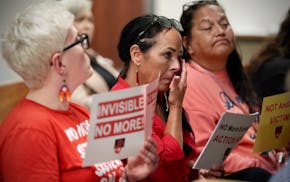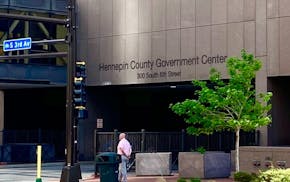Minnesota communities with "sanctuary" immigration policies face new uncertainty with President Donald Trump returning for a second term with a top priority of deporting immigrants in the country illegally.
Minneapolis and St. Paul both have sanctuary-type policies and at least a dozen Minnesota counties have been identified as uncooperative with Immigration and Customs Enforcement (ICE) requests.
Trump and his allies again are threatening leaders of sanctuary communities across the country with the loss of millions in federal funding and even jail if they refuse to cooperate with federal immigration officials.
Attempts during his first term to force cities to help ICE under threat of losing funds were largely unsuccessful because of legal challenges. Local leaders say they comply with all state and federal laws and are unsure what to expect after Trump is inaugurated Monday.
What is a sanctuary city or county?
There is no legal definition of a sanctuary jurisdiction, so it can mean different things depending on the community. Dozens of cities and counties have some type of sanctuary law or policy limiting local officials' involvement in federal immigration enforcement.
Minneapolis and St. Paul have "separation ordinances" that discourage or prohibit employees, including police, from asking residents about their immigration status, except when required by law. They also limit what data can be shared with federal immigration officials, unless by a court order.
Some Minnesota counties have similar policies limiting the information they gather about residents' immigration status. But the biggest point of conflict with ICE is at county jails.
Jails in the metro and some in greater Minnesota, such as Pipestone and Lyon counties, limit their cooperation with immigration officials, including not providing information on people in custody, not notifying immigration officials when a suspect is released, or refusing to hold prisoners for ICE without a warrant.
The local debate over sanctuary policies
Supporters of sanctuary policies argue they allow communities to make the most of limited resources by not spending time and money enforcing civil immigration laws. They say public safety improves when residents are not afraid to report a crime or testify in court because of their immigration status.
Opponents say local governments are required to help enforce immigration laws. They contend sanctuary policies attract unauthorized immigrants and lead to higher rates of crimes involving drugs, weapons and human trafficking.
In terms of cooperating with ICE in county jails, a January 2020 district court ruling found the Nobles County sheriff could not hold immigrants for federal officials after the prisoners had posted bail, finished their sentence or had their cases dismissed.
In contrast, at least three Minnesota counties have contracted with ICE in recent years to hold detainees. These deals allow counties to hold people facing civil immigration charges.
What is at risk if communities don't cooperate?
During his first term, Trump tried to withhold about $250 million in Justice Department grants from local police and sheriff's departments with sanctuary policies.
The move ended up in a multi-year legal battle, with at least one federal appeals court in New York siding with the administration, before the effort was reversed when President Biden took office.
In December, America First Legal, a group founded and led by Trump advisor Stephen Miller, sent letters to 249 local officials across the country, including a dozen in Minnesota. The group threatened potential criminal liability and financial penalties for local leaders who refuse to cooperate with federal immigration efforts.
Immigration advocates say the group's interpretation of the law may not be accurate and they questioned whether local leaders could be criminally penalized for long-standing policies limiting cooperation with ICE.
What might happen at the Legislature?
Minnesota Democrats have unsuccessfully tried to expand sanctuary policies to the entire state, while Republicans have failed to make sanctuary cities illegal or cut their funding. That's not expected to change.
Nevertheless, lawmakers will likely consider bills to increase penalties for human trafficking and for businesses that knowingly hire immigrants without authorization to work here.
With the Legislature narrowly divided, it is unclear whether any immigration related laws can win approval this session.

'Red alert': Researchers say Minneapolis is failing in response to domestic violence calls

After barrage of gunfire, neighbors, city officials take critical look at Boom Island Park safety

Bushel Boy, Minnesota's local tomato grower, sold
Federal agents surround south Minneapolis restaurant, clashing with protesters

